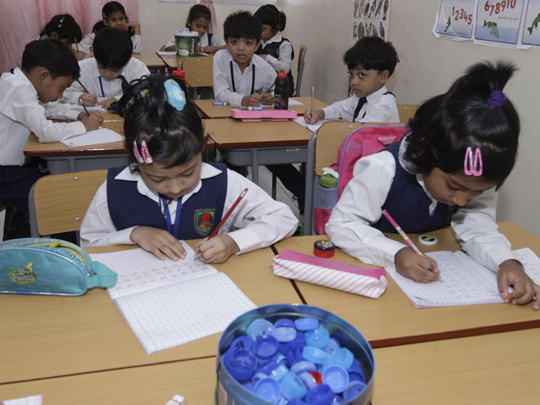
Abu Dhabi: Schools in the emirate of Abu Dhabi are still struggling to help all pupils develop to their full potential because of the lack of differentiated teaching methods, senior education officials announced in the capital on Tuesday.
In addition, Arabic language teaching remains below par at many facilities, and teacher turnover is unacceptably high at an annual rate of 20 per cent, said Edward Murtagh, manager of inspection and monitoring at the Abu Dhabi Education Council (Adec).
“These challenges have prevented many schools from attaining better evaluations in the ongoing third round of school inspections. In fact, the low standards in Arabic teaching are one of the main reasons why no school has yet been judged as outstanding (Band A, Grade 1),” Murtagh said.
He was speaking at a conference that aimed to create a better understanding of the school inspection process. The event saw 200 representatives from public and private schools in attendance.
Since 2009, private schools in the emirate of Abu Dhabi have been inspected, and the results have been published. The third cycle of inspections for these 189 schools, which enrol about 225,000 pupils, is currently ongoing and these results will be announced at the end of the 2014-2015 academic year.
Officials also announced that public schools are being inspected for the first time in this inspection cycle, and these evaluations will be released in 2015 as well.
At the conference, Dr Amal Al Qubaisi, director-general at the Adec, called upon delegates to place greater emphasis on Arabic language learning and teaching. This is a particular concern because about 24 per cent of the pupils in private schools are Emirati, and this proportion is set to grow as the 28 per cent of pupils now in KG 2 will soon progress to higher grades in these schools. All these pupils currently face insufficient opportunities to learn the language.
“Mastering both Arabic and English is increasingly important as the world’s interest in the Arab world continues to increase. We must therefore ensure that the language is a key component of teaching and learning not only for Emiratis and other Arab nationals, but also for non-Arabic speakers enrolled in private schools. We need to help them learn our language in order to reach a deeper understanding of our culture and values, and also to help enhance their future opportunities,” Dr Amal said.
Murtagh mentioned that 80 of public schools and 74 per cent of private schools currently have curriculum plans to help the development of national identity. However, in most cases, pupils’ scores in the Arabic language continue to be low compared to results in other subjects.
“British curriculum schools fare the best in Arabic language learning, but they too have a lot of room for improvement,” he added.
Murtagh also urged schools to hire and retain qualified and experienced teachers who are best able to provide differentiated instruction based on pupils’ varying needs.
“In the previous cycle of inspections, nearly two-thirds of private schools had unsuitable teachers, and the effects were most visible at kindergarten level. These tutors did not include play within the educational process, did not emphasise collaborative learning or creativity, and did not enable progress for pupils,” he said.










